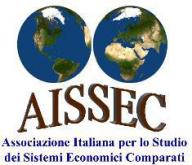24 | FEBRUARY 2023
Edited by Luca Bortolotti and Marta Marson , University of Turin and OEET
OEET has organized its 8th Workshop on the 1st and 2nd December 2022 at Collegio Carlo Alberto, Turin, titled “A fragmenting global economy: Economic and geo-political shocks and international / regional trade and investment agreements among advanced and emerging countries”.
The Workshop aimed at examining the economic and geopolitical shocks that have affected the global community since 2008, and their impact on the relations among advanced and emerging economies. The Workshop also aimed at exploring how Global (and Regional) Value Chains were reshaped by those shocks. Indeed, shocks as the Global Financial Crisis and the ensuing Great Recession, the US-China trade war, the Covid-19 pandemic, and the Russia-Ukraine conflict have severely damaged the world economy. Moreover, relevant consequences of this fragmentation have emerged in the fields of global action on climate change and on international trade agreements.
This issue of the OEET newsletter collects contributions based on three lectures given at the Workshop, which provide a brief but detailed picture of the current challenges faced by the global community disentangling the different and sometimes opposite interests of different countries, therefore linking the field of economic and technological development with those of geopolitics and international relations. A special focus is reserved to the largest players in the global arena, including of course China.
by Vittorio Valli[*]
This article describes the crucial changes that occurred in the global economic power of major countries in the first part of the XXI Century. In particular, we focus on the changes occurred in terms of economic size, military force, financial power and social cohesion (i.e. some of the pillars of global economic power).
Moreover, in the period 2000-2022 four trends and shocks crucially influenced the global order: (I) diverging trends in terms of energy dependence from foreign sources, with the US almost fully independent thanks to shale oil and shale gas productions, while most of the EU countries have increased their dependence from Russia and other energy exporting countries; (II) a rapid growth in CO2 emissions, triggering global warming and other disruptive effects only tackled by timid and partly ineffective reactions; (III) a sequence of three great shocks (the 2008 financial crisis and the “Great Recession”, the Covid-19 pandemics and the Russian invasion of Ukraine) affected the world economy and, in particular, the Western countries; (IV) Besides economic crises and the disruption or weakening of several global value chains, since 2022, inflation pressures rose rapidly, while traditional restrictive monetary policies seems unbale to tackle without severe social and economic consequences.
by Ignazio Musu[*]
China plays a crucial role in energy geopolitics, both in terms of fossil fuels, which still constitute the core of its energy system, and in terms of renewable energy and fight against climate change. The Belt and Road Initiative is an important infrastructure, because of oil and gas pipelines from Central Asian countries, as Kazakhstan and Uzbekistan, and from Russia, involved in a closer relationship after the outbreak of the Ukraine war, because of the oil imports from the Middle East and because of the role of natural resources in the South China Sea, claimed by China and by other coastal countries.
Dealing with renewable resources and commitment in fighting climate change, the role of China is becoming more and more crucial: President Xi Jinping announced the goal of “have CO2 emissions peak before 2030 and achieve carbon neutrality before 2060”. Solar, wind power, nuclear and hydrogen energy are expected to increase, so low-carbon energy are expected to reach a 75% share in 2060, contextually with a reduction of carbon (-80%), oil (-60%) and natural gas (-45%) demand.
by Giovanni Graziani[*]
The so-called trade war between the US and China, which started as a tariff war, has soon become a technological conflict. In fact, next to growing tariffs from both sides, covering 66% of US imports from China and 58% of Chinese imports from the US, the conflict has witnessed the increasing use of other policy tools in order to slow down reciprocal trade flows. The US have resorted to an export control policy for their semiconductors, software and equipment for their production. Controls have been extended to all the products that China might utilize for the development of its own industry in that field.
Chinese retaliation has quickly materialized, especially through a new law on export control that obliges Chinese exporters to strictly comply with it and leaves a wide margin of manoeuvre to the Chinese authorities, when they want to prevent undesired exports. The ultimate reason of this technological conflict lies in the fact that the US technological predominance is being slowly eroded by Chinese advances in many technological fields, including artificial intelligence. The biggest American worries result from the activity of the Chinese firm Huawei, specialised in telecommunication infrastructure equipment, in particular concerning fifth generation (5G) technology. Trade war has not benefitted the two contending countries, which saw a decrease in their reciprocal trade and have undergone other negative, sometimes unintended, consequences, due to their insertion in the global value chains. Although other countries have derived short-term commercial advantages by substituting the reciprocal trade flows of the two superpowers, major global damages were caused by disruptions in the global value chains and by the wound to the international trade system centered upon the World Trade Organisation (WTO), insofar as both superpowers have behaved without respecting the WTO rules. Although many analysts point to a progressive decoupling between the American and the Chinese economies, the data so far do not support a general trend, but only a partial one, referred to the products involved in the export control policies. The fundamental pillars of their reciprocal economic dependency appear still in place. However, more recently, the policies adopted by the two governments, some international initiatives and their official declarations could foreshadow a process of partial technological delinking.
Our activities
-
AFRICA: DEVELOPMENT, SUSTAINABILITY AND GREEN TRANSITION
Tuesday, January 27th 9.45 – 17.00 Aula SV002, Università Cattolica del Sacro Cuore; Via San...









